
She/her | 22 | 🩷💛🩵-💚🩶🤍🩶💚Blogging about my various interests including TV shows, film, books, video games, current events, and the occasional meme. My letterboxed: https://boxd.it/civFT
123 posts
Latest Posts by sayaosi - Page 2




FANTASTIC MR. FOX (2009), dir. Wes Anderson
Queerness, Gentrification and Cultural Genocide in the film La Mission
This is an essay I wrote as part of my pursuit of an Ethnic Studies degree at Cal State East Bay during the Fall Quarter 2017. This will be part of a series of essay posts from my classes at the end of my school quarters. This and all of my essays were written under my legal name, Dennis Camargo.
In the film La Mission, the audience is introduced to Che, a former prisoner and alcoholic, and his son Jes, a student just about to graduate high school. The plot of the film focuses on the tumultuous relationship between Che and Jes after Jes was inadvertently outed as a gay man by his father stumbling across photos of Jes in a gay club. In the film there is an underlying tone of Che interpreting male homosexuality as a force of consumerism and gentrification in La Mission, the area of San Francisco where the film takes place. Che is unable to reconcile his son’s queerness, therefore branding his son as a race trader and being complicit in the cultural genocide of a historically Mexican district of San Francisco.
Very early in the film, the audience is met with Che’s fears of La Mission falling victim to gentrification like many other parts of San Francisco. Che confronts his neighbor Lena, who has filed a complaint against Che with their landlord for blocking the sidewalk with his lowrider. The audience sees Che’s defensiveness against this complaint as encroachment of seemingly God-given right as a Mexican man to exert his dominance and symbols of masculinity in his Azatlan, the mythical homeland of Aztecs and by extension Mexican culture. He states “…after all you hipster types are tired of slummin’ it, I’m still going to be here,” to Lena, a black woman who personifies a typical hipster/gentrifier complete with fixed gear bicycle and an interest in New Age beliefs (00:10:15). Despite her race, her hipster interests are typified as white behavior and therefore is an extension of the cultural genocide of La Mission district. While her lifestyle is not necessarily queer, it is accepting of queerness which opens the door for more white culture to smother the hypermasculine, hyper heterosexual Chicano culture of La Mission.
Che has a very complex interpretation of his son’s queerness because of his history as a convict, his addiction to alcohol and the association of gay culture with alcohol, whiteness and consumerism. Che’s few associations with gayness are exemplified with the line “Is that why he’s manhandling you like you’re some Mexican bitch?,” (00:27:05) when he confronts Jes with the photographic evidence of is encounter with his white boyfriend. Another instance is an ad for here!, a gay-oriented on demand television channel being advertised on the busses he drives (00:40:26). These two instances can be interpreted as colonial, capitalist gentrifiers of his Azatlan, making Jes la Malinche, a historical figure vilified by Mexican people for selling out the Native Mexicans to the Spanish (Garsd). On a very tangential note, his association with queerness and clubbing, therefore alcohol use, can be seen as a white drug adulterating a perfect Aztec life, as there tremendous pride in Aztec identity among those who pride themselves as Chicano. This adulteration can be tied to the trope of Native Americans struggling with alcohol abuse.
Conclusively, while Che’s interpretation of queerness and white hipsterdom gentrifying traditional black and brown neighborhoods is not necessarily incorrect, he fails to see the nuances of being queer. Queers of color can be equally weary of gentrification and cultural genocide of historically black and brown areas and are willing to protect la raza from falling victim to capitalism. Understanding of the intersectionality of being brown and queer will help in the effort against gentrification.
Citations
La Mission, www.amazon.com/Mission-Benjamin-Bratt/dp/B003ZZ4H6K/ ref=sr_1_1? ie=UTF8&qid=1509596248&sr=8-1&keywords=la%2Bmission&dpID=513tWYMpb7L&preST=_SY300_QL70_&dpSrc=srch.
Garsd, Jasmine. “Despite Similarities, Pocahontas Gets Love, Malinche Gets Hate. Why?” NPR, NPR, 25 Nov. 2015, www.npr.org/sections/goatsandsoda/2015/11/25/457256340/despite-similarities-pocahontas-gets-love-malinche-gets-hate-why.
I've been trying to watch more movies with Swann Arlaud in it so I watched Perdrix last night without knowing anything about the storyline. Definitely one of the strangest movies I've seen and also surprisingly funny. I would say it's worth the watch!

I think one of the reasons this film resonated with many of us (or maybe it’s just me) is the fact that those of us who crave beauty in the most ordinary things want to spend our lives in a similar manner. In a time where hustling is a desired facet of one’s personality, the movie emphasizes a slow life. An enjoyable life. For those of us who want to stop and stare at the beautiful sunset/sunrise and feel content, we are trying to be part of the beauty too, in ways which we are familiar with. Capturing modest pictures that we find beautiful, treating this little life we were gifted so preciously, leaving little space for extravagance, and looking forward to a quiet life; making the most of those small moments we have for ourselves, contemplating the few books and films we’ve consumed in our lifetime, wishing we lived inside a Ghibli movie, treating life with respect.
We watched the repetitive moments earnestly because, like Hirayama, we too loved watching the leaves sway, light scattering through their gaps, and the dappled shadows, even if it was through a screen, a smile creeping onto our faces whenever Hirayama found a sight worth smiling for.
A lifetime spent searching for beautiful things is a beautiful matter in itself. Noticing the countless crevices on tree barks, recognizing the pattern of veins on a leaf when held up against the sun, feeling the warmth of a sunny day — the more you pay attention, the more these moments find you. We try to embrace love and be engulfed by it; sometimes we lose, and other times we win.
I first heard the word ‘Komorebi’ (木漏れ日) in a Radwimps song, and even without knowing its meaning, I found it very beautiful and would sing that word multiple times. Now that I know what it means, I realize that the real beauty is always there; it’s us who change in ways we couldn’t have predicted.
i just saw perfect days and i don't want a smartphone anymore. like, i genuinely don't want this thing anymore. i'm starting to think about all the times i've missed something beautiful existing in front of me because i felt the need to look down at my screen. how much time have i wasted getting quick hits of dopamine instead of getting true enjoyment from something as simple as the sunshine rippling through the trees? i'm wondering when my appreciation for real beauty met its death by way of an addiction to artificial blue light. there's no surprises or moments of amazement when you're constantly attached to the interwebs.
but i want to be surprised. i want to be amazed. i want to feel life again through my own skin, not another mindless swipe or tap.



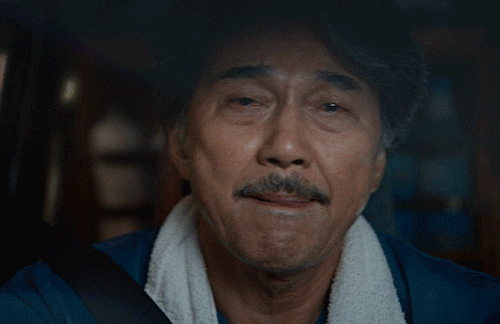
Perfect Days (2023) dir. Wim Wenders
reason why frasier is such an underrated show: whenever niles tries something to stop daphne from dating another man (and his flare-ups of jealousy are never done as much as corresponding nice guys on friends or himym) it's not played off as cute or acceptable or something that's justified because he's 'the nice guy who was in love with her all along'. in fact, in most of the examples I can think of, after getting some sense slapped into him niles always ends up supporting daphne in her romantic relationships because he knows it's the right thing to do.
and even though niles is the archetypal 'dogged nice guy' trope, the show makes him actively examine the flawed lens he's regarded daphne through all these years, before he actually gets the girl (at least, in a sexual sense). it's not a case of 'nice guy gets rewarded because he's nice and was a stalker with a crush', it's a case of niles only being able to be in a full and healthy relationship with daphne once he's sorted through those years of longing and come to see her as a fully fledged human being, not just an object of adoration.
house of hummingbird (2018)

house of hummingbird is a coming-of-age tale of how an ordinary 14 year-old girl finds herself amidst the relationships she develops with the people around her. in doing so, the film draws on themes big and small, which effectively paints a scarred national psyche and depicts the struggles of normal people as they try to keep apace.
the film can be described as a quiet feminist criticism of gender inequality in a “modern” society. eun-hee and her good friend, ji-soo, are victims of domestic abuse by their older brothers, who have been conditioned by patriarchal notions that empower them to assault their sisters as a means of “reprimanding” them and keeping them in order. when eun-hee and ji-soo are caught for shop theft, ji-soo trembles at the fear of being hit by her brother back at home. when eun-hee bravely tells her parents over dinner, in the first third of the film, that her brother had hit her, her older sister gives her a glance. initially i thought the glance was a glance of surprise and reproach, as if to tell eun-hee to remain silent. but i later realise the glance meant that she herself was a victim of her brother’s abuse, and the glance was a pleasant surprise at her courage. the uncomfortable coexistence of domestic assault and women’s education empowerment (the daughters are enrolled for after-school tuition), points to how society’s claims of modernisation will always ring hollow if women cannot even have basic human rights.
the exhortations of gender inequality are constantly woven in the film. eun-hee’s mother knows that her father is having an extramarital affair, but never explicitly addresses it. nonchalantly asking eun-hee “what was your father wearing when he went out today?” and then checking his closet to see whether he wore his best suit out on a date, eun-hee’s mother is the film’s closest representation of the virtuous traditional asian wife. eun-hee almost walks in her mother’s footsteps - even after seeing her boyfriend flirt with her schoolmate, she takes him back immediately with little questioning. it is only with young-ji’s advice that she needs to not live her life passively that eun-hee starts to assert herself and retaliate. when eun-hee is caught for shoplifting, her father tells him he would rather the shopkeeper send eun-hee to the police station than send some rice cakes over as a “favour”. this is in contrast with her father’s treatment of her brother, offering him money to buy burgers to bribe his schoolmates to vote him as school president.
eun-hee’s relationship with yoo-ri, her junior at school, is less significant as an exploration of sexuality but rather an example of how eun-hee is desperately trying to find true companionship in the people around her. contrasting her friendship with ji-soo (they had a falling out but later reconciled) and her relationship with yoo-ri (yoo-ri fell out of affection and ended the relationship coldly), eun-hee learns that lasting relationships need to be built and are hard to come by. this is why her relationship with young-ji, a teacher at her chinese hakwon (after-school tuition), is extra special.

it is easy to see why teacher young-ji is a figure of admiration for the impressionable eun-hee. young-ji lives a quasi-ascetic and independent lifestyle - she dresses in baggy linen, brews oolong tea in a set of china, and in their first meeting teaches eunhee “out of all the people you’ve met in your life, how many of them really know you?” in hanja. she quits her job at the hakwon out of the blue, because she felt like it; she is on a long break from her undergraduate studies at Seoul University, because she felt like it. of course, this independence is afforded by young-ji’s privilege (her family is well-off). but her non-traditional behaviour teaches eun-hee that there are ways to live without conforming to society. she never talks to eun-hee with condescension, but treats her as a mature equal and genuinely cares for her in ways that eun-hee has never received.
in terms of style, i very much appreciated the sensitive directing of kim bora, which drew the viewer very close to the protagonist. there were very clever tricks deployed. there is a moment when eun-hee is caught shoplifting and the shopkeeper asks for her father’s number, to which she whispers “555-2589″. when eun-hee frightfully presses this number into the public phone after she sees the bridge collapse, kim borrows this memory, as the viewer knows who she is calling before she even says a word.
but the best moments were always personal. as a 24 year-old asian female, even the slightest scenes were poignant. when eun-hee ended off her never-delivered letter to young-ji with “when will my life start to shine?” i just started crying, because i wanted to tell eun-hee that her beloved teacher probably doesn’t know. i don’t know too. when the film ended with eun-hee having found an internal peace, through young-ji’s words of advice, that would help her navigate life’s tribulations - big or small - i started to cry again. we have all struggled to find ourselves, amongst the many expectations placed on us in the different roles we play in society. even though not all of us have a figure like young-ji when they were growing up, the answer to finding life tolerable is always the same.
i love this film - i really, really do. i am eun-hee when i was 12, i am young-ji now. i love this film with a camaraderie that is shared between all asian women who have struggled and are struggling to find their places in society. –10/10

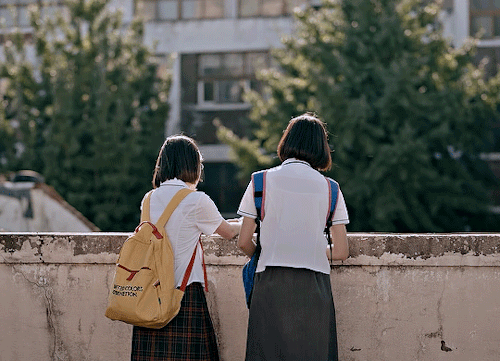



What’s the right way to live? Some days I feel like I know, but I really don’t know for sure. I just know that when bad things happen, good things happen too. And that we always meet someone and share something with them. The world is fascinating and beautiful.
House of Hummingbird, 2018 dir. by Kim Bora




“Eun-hee… When you’re tired or sad, try looking at your fingers. Then, one by one, move them around. It’ll feel very mysterious. You feel like you can’t do anything, but you can move your fingers.”
House of Hummingbird (2018), written and directed by Kim Bora






House of Hummingbird 벌새 (2018)
Watched/read
Feminine and feminist cinema.
House of Hummingbird: the main character, Eunhee, was in eighth grade in 1994, which is to say she – and Kim Bo-ra, the director – are nearly exactly my age. It’s a sensitive, Proustian evocation of a ‘90s South Korean female adolescence, parts of which I relate to (those pagers!), parts of which I knew nothing about (one date chyron I won’t spoiler, that drew gasps from the audience), and parts of which are evergreen (dysfunctional Asian families where the only love languages are verbal abuse and food, and emotional support is non-existent even for favoured first sons). The sporadic outbursts of domestic violence, in particular, are so true to life as to be triggering; it made me think of people IRL to whom I’d only recommend the film with a warning. The actors are all very good but the one I’ll think back to is Kim Sae-byuk, who plays Eunhee’s mysterious yet relatable Chinese tutor and imbues the supporting character with a vast sense of inner life. The camera watches her face and you feel what she’s feeling for this girl, from the other side of the unidirectional gulf that is the Tired Adult™ looking upon an eighth grader much like she once was.
21st Century Girl: a thematic omnibus of short films commissioned from emerging female Japanese filmmakers, each of which has to be about love, gender, or sexuality in some way. One does what one can with the running time: some oblique love stories, some LGBT themes, some in media res snippets of what might eventually end up as feature-lengths with a beginning and an end, lots and lots of photographic montage and manifestos in voiceover. I liked “Your Sheet,” a gender-fluid erotic story that was also the most successful bit of standalone short fiction, and the rom-com concept of “Sex-less Sex-friends.”
Dare to Stop Us: for once I would have liked a Q&A session with the director and writer, because I have questions. The film is a dramatization of the late ‘60s-early ‘70s imperial period of Wakamatsu Studios, the “pink film” (experimentally x-rated, but also raging leftist pink-o) outfit founded by Wakamatsu Koji, an enfant terrible of Japanese cinema who used to be yakuza and purportedly turned to film so he could kill off cops without getting arrested. The main character is Megumi, a hippie girl who joins the studio at the age of 21 and works her way up to first AD within the year, not least due to the other ADs quitting. Megumi comes off as a designated-naif entry-point POV, possibly – I thought – a composite of women who worked for Wakamatsu, and the arc of her story seemed to bend toward surviving (gender-neutral) workplace hazing and becoming a successful indie director in her own right, as Wakamatsu promises when he hires her. Spoilers: she is not a composite! She existed, and what happens to her is gut-wrenching! It’s a rug-pull, honestly, especially since the director Kazuya Shiraishi worked with Wakamatsu and the initial vibe is “feel-good biopic of characters and environment I have huge nostalgic affection for.” In retrospect, one has to conclude he was half making that movie, half interrogating how the guerrilla filmmaking milieu can chew up the people who love it most, and is particularly unforgiving to women even when their bosses and peers aren’t overtly sexist.
(I also have questions about the slickly urbane portrayal of Oshima Nagisa, sitting in a cafe with his sunglasses telling Wakamatsu not to push his pro-Palestinian documentary too hard because the film world is “run by Jews,” because hoo boy was that a Moment.)
America Ferrera's breakthrough career
I just want to point out that this woman has delivered 2 cinematic, historical, browsing, impeccable speeches about the frustrations I feel about being a woman. And that actress of course is the one and only America Ferrera herself. Let's talk about her debut role in the movie — Real Women Have Curves. The 2002 independent film based on the play by Josefina Lopez is one of my all-time favourite movies I have watched in my lifetime. And if you somehow know this movie through another suspicious Greta Gerwig connection, I implore you to watch this. The movie was directed by Patricia Cardoso. At the time when it was released, America Ferrera had already filmed another movie but this movie debuted first putting her on the map. She was only 17 years old! Josefina López wrote the play when she was 18 years old. In 2019 it was the first Latina directed film to be included in the National Film Registry at the library of Congress. Taking inspiration from her real life, Josefina wrote Real Women Have Curves about Ana, mostly centered on her relationship with her mother Carmen, played by Lupe Ontiveros. This movie is touted, not only for its representation of women in their real bodies, it also delivered a warm and loving portrayal of Latina families and neighborhoods in Royal Heights and East Los Angeles. Again this isn't a time where Latinas, even today, are represented in a full and nuancent light. So to not only have this Latina family but to have them placed in East Los Angeles which has been criminally and stereotypically portrayed as "dangerous", really meant something and still means something today. And the message of that film being "there's so much more to me than my weight". I think this might serve as a comfort watch for many women around the world.
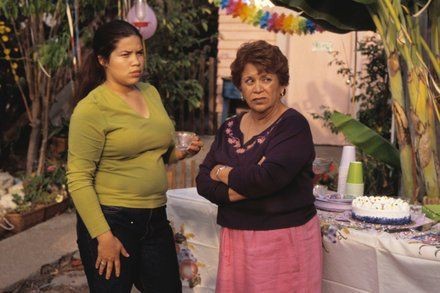
I don't understand how we were made to believe as children, that America Ferrera was the biggest woman to ever grace our tv screen. The Sisterhood Of The Traveling Pants is what I call perfection in cinema. If I ever will have a daughter in the future, she is required to watch this movie. Because every little girl needs to understand what sisterhood and what community is. I feel like girls today are not watching sisterhood displayed on television, or even in movies. It's always these toxic relationship, these toxic friendship — not to say that neither of those can't be toxic and bad, because even within this friend group they all have their own issues with each other, with their families etc. But it's not about the problems, it's how they solve them, how they come together. And I feel like this message should be displayed for the young girls today. And I just love how diverse the friend group is, because nowadays it seems like every teenager I see on tv are like the same skinny, white blondes. If you haven't seen this movie make sure to have a box of tissues nearby because it's going to make you cry.

The dark side of pretty privilige is, you don't get to be funny, intelligent, respected — you just get to be pretty. So I've just finished watching Ugly Betty, I fully recommend, and I realised the only female character who's actually respected within this show, is Betty. If you don't already know the concept, Betty gets hired to be the assistant to the chief. Because he sleeps with his assistants, they decide to get him an "ugly" girl so he won't sleep with her. But she's hired for Mode, which is kind of like Vogue/Cosmo type of magazine. So naturally she gets bullied. They treat her like crap because she doesn't look like the ideal Mode girl. But the crazy thing is, since none of the men want to sleep with her, they actually respect her. They start to treat her like a human being with ideas. Then she becomes one of the most liked people by anyone in their team. On top of that, all of these gorgeous women get treated like absolute crap. No one listens to them, their ideas are not heard, and they're not respected. So it leaves a very clear message: wether you are gorgeous or "ugly", misogyny will still hunt you down and it will catch you. For Betty, men don't look twice her way. They treat her bad from the moment they see her. Just because they don't want to sleep with her, they don't find her attractive. For the beautiful women in the show, like Amanda who is painted as the gorgeous blonde, men only want to sleep with her, and they don't see that she's smart. Go back to watch the show and you'll see how horribly the other women get treated compared to Betty (and they have some good cameos in this show).

As we are reaching the end, we can claim America Ferrera as "that girl". The term is, in my opinion, used for anyone who dresses like a fashionista and acts like the queen they are. But it's much more than that. I think, to achieve that title you have to be also impactful and encourage other women to be what they want to be. America really proved it by playing the Emmy Award winning role of Gloria in Barbie, directed by Greta Gerwig. I think every cis, heterosexual white male should be forced to sit down and watch this movie. The message behind the Barbie movie is about going from being a girl to being a woman. Barbieland is what our childhood felt like; we were safe, naive, independent and everything seemed perfect. The real world is what womanhood actually is. It's scary, sexist, there's pain and we're faced with so many challenges, while still being held to unrealistic expectations by society. "We mothers stand still, so our daughters can look back to see how far they've become". America Ferrera's speech about how hard it is to be a woman, really affected me and made me tear up in the theather. "It is literally impossible to be a woman. You are so beautiful, and so smart, and it kills me that you don't think you're good enough. Like, we have to always be extraordinary, but somehow we're always doing it wrong. You have to be thin, but not too thin. And you can never say you want to be thin. You have to say you want to be healthy, but also you have to be thin. You have to have money, but you can't ask for money because that's crass. You have to be a boss, but you can't be mean. You have to lead, but you can't squash other people's ideas. You're supposed to love being a mother, but don't talk about your kids all the damn time. You have to be a career woman but also always be looking out for other people. You have to answer for men's bad behavior, which is insane, but if you point that out, you're accused of complaining. You're supposed to stay pretty for men, but not so pretty that you tempt them too much or that you threaten other women because you're supposed to be a part of the sisterhood." America Ferrera the woman you are, thank you so much for helping me and other women to believe in theirselves. Happy international women's day! <3

Great review!
Anatomy of a Fall (2023)

Of all the legal thrillers I’ve seen, Anatomy of a Fall feels the most genuine and relatable. While there are big revelations about the people involved and technically, they come suddenly, this isn’t a story of accidental confessions, surprise witnesses, or even earth-shattering pieces of evidence. Something happened while there were no witnesses present. The court must decide whether a crime was committed or not based on the evidence. That's it. In the process, the film peels back layers to reveal the truth and half-truths that comprise relationships.
Sandra Voyter (Sandra Hüller) is woken from a nap by her son, Daniel (Milo Machado-Graner). Her husband (his father), Samuel Maleski (Samuel Theis), has fallen from their roof and died. She insists it must have been an accident - he was working on the roof when she went to sleep. The authorities are not convinced and she is indicted on charges of murder.
There’s a particular line in the film that summarizes what a nightmare this situation is. It's something like “What you hear, it’s just a small part of the whole”. As we're presented with testimonies from experts and people who knew Samuel, as more evidence is brought forth, we're given a version of Sandra and Samuel's relationship. In a way, it’s not even Sandra who’s on trial; it’s her marriage. If she and her husband fought a lot, if someone was unfaithful, if someone was planning on leaving, then it probably means Sandra killed him. It’s not even if the whole relationship was bad; it’s if it was bad recently. We're not talking about "a rough patch" or something they could've overcome. This fragment is now the whole.
In a way, the trial is a matter of life and death. The jury is deliberating whether Sandra killed her husband. It’s also about an intimate subject you could call mundane in the grand scheme of things: two people’s marriage. Drawing a conclusion from the snippets presented is an unfair way to judge their relationship but it’s also the best way to see what it was like because you get the “highlight reel”. By the time this film is over, you feel like you know these people so well that they're no longer characters in a film. Then, you remember that quote from earlier and you second-guess everything. Do you really know? That sentiment is amplified by the revelations that come up during the trial. They’re not the sort of bombshells you’re used to seeing in these legal dramas, but they’re just as earth-shattering and revelatory.
The film is as absorbing as it is because of the excellent script by Justine Triet (who also directs) and Arthur Harari and the performances. There are so many character moments in Anatomy of a Fall that I see it as the kind of film you would come back to in the future, despite so much of the suspense coming from the uncertainty of the final verdict. Even some of the minor characters I keep thinking back to, like the two forensic analysts who bring to the stand completely different interpretations of three drops of blood found outside. It makes you wonder if they - despite having no investment in this narrative whatsoever - somehow made up their minds about the case anyway and brought in their biases. Why else would they be so combative? Many characters are deliberately unlikable, but not in a way that makes them villains. Wait. Did I dislike them because of who they really are, or because of the way I perceived them based on the evidence presented? hmm.
Anatomy of a Fall is a film of complex emotions. There are so many details in the case, the way the characters behave or relate to each other that you forget everything else around you. The performances are excellent, as is the script. You've never been put on trial for murder before but you'll know what it must feel like once the end credits roll. (March 27, 2024)

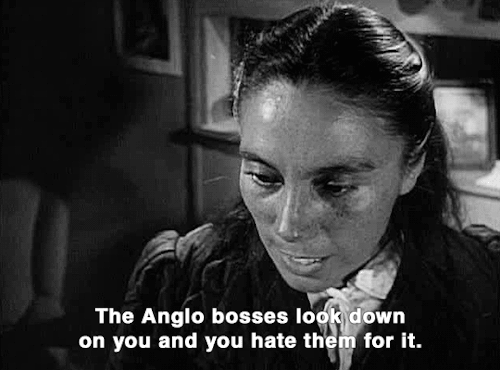

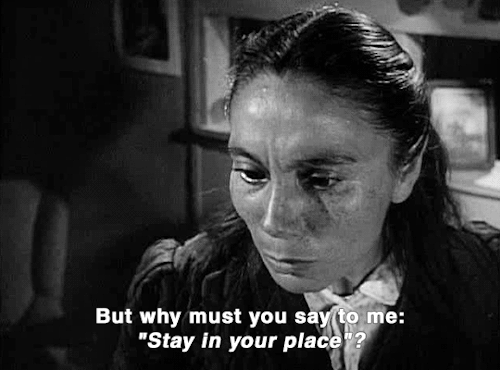

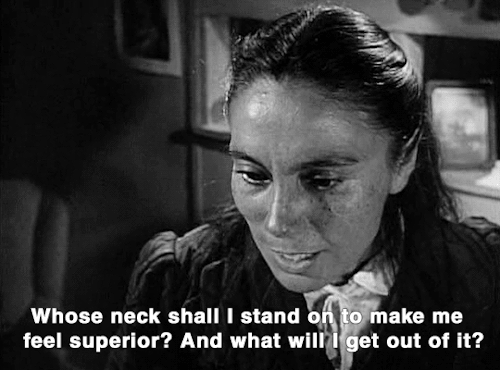
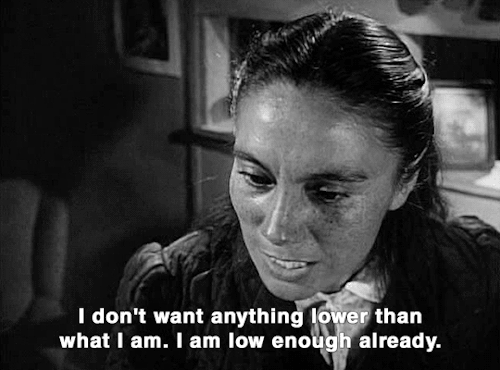


Salt of the Earth (1954), dir. Herbert J. Biberman
Just finished watching season 2 of Broadchurch. Tbh I lost interest about halfway through, but I wanted to finish it. It was so frustrating to watch. It bothered me that Beth seemed to be so upset at the fact that Mark cheated on her, but not at the fact that HE HIT DANNY. I thought the lawyers might develop some interesting story lines but, unfortunately, they just didn't do it for me. I could've done without the Sandbrook story line or maybe if they changed what happened/who killed the girls it would have been more interesting. Anyway, I did enjoy the first season of Broadchurch! I just wasn't a huge fan of this one. I probably won't watch the last season.
I'm convinced, that "Koisenu futari" is an extremely underrated show. The importance of its existence is simply enormous. Not only because of the aroace representation, but also because of how it helps allosexual people see what life and relationships can look like from a completely different perspective. How it teaches them to be more open and accepting of people who are different from them. And how it completely destroys all the patterns of modern film industry, considering that even in children's cartoons there is still, not very big, but usually at least some kind of romantic plotline for the main character. I'm so in love with this drama that I just can't
If you watched and loved The Bear and feel like crying some more you should watch Boiling Point (2021)

While I’m here ... you’ll hear/read a lot about Stephen Graham in this newish British film, and of course he’s good, but Vinette Robinson is totally brilliant and the best reason to see it. Just saying.
Can we stop acting like two people deeply loving each other has to mean they have something romantic or sexual going on? Can we stop talking as if platonic love just can't be that deep? Because that's not true. Platonic love can be just as deep, and sometimes even deeper, than romantic love. What I'm saying is, we need to stop putting romance on this pedestal and act like every other form of love is less important.
gotta love his dark curly wurly hair

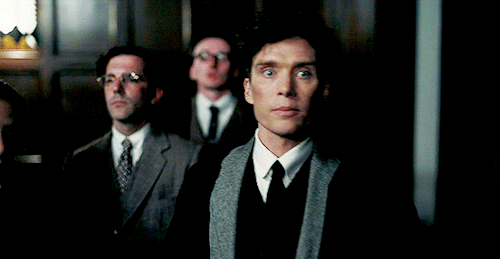

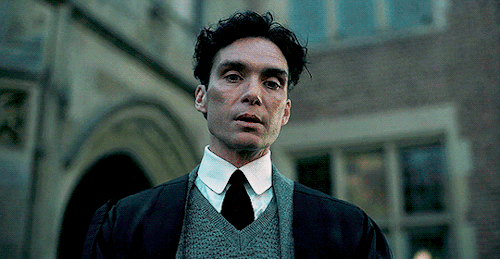
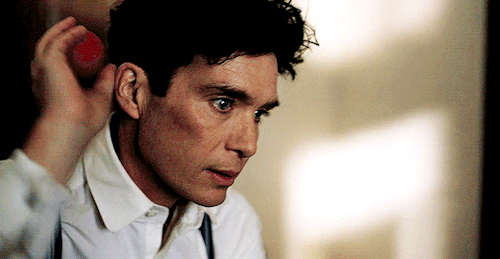
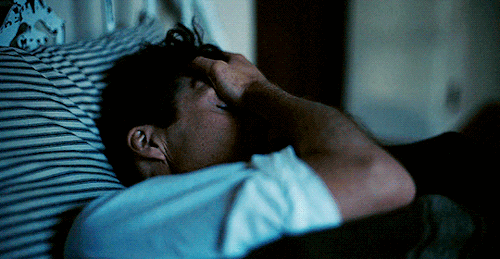


Cillian Murphy in Oppenheimer (2023) dir. Christopher Nolan

Robert Mapplethorpe Embrace 1982
The casual intimacy of being single, living by yourself, and drinking in the bath. Unparalleled.


Fallen Angels (1995) dir. Wong Kar-wai
One thing that amazes me about Dark is how it managed to portray Jonas and Martha as the darkest of villains (both committing mass murder by causing the Apocalypse, ordering several murders, kidnappings, lying and manipulating people) while at the same time portraying them as such selfless heroes.
Because when you think about it, Jonas and Martha are actually incredibly selfless and heroic. When they are told that they need to go to the origin world to save it and end the knot, and that by doing so, not only would they cease to exist but their entire worlds and the people they loved would also cease to exist, they both agree to sacrifice themselves immediately (Jonas agrees on the spot, and Martha only needs five seconds to compose herself and agree). And this moment is a very selfless moment for both of them.
I've seen so many people argue that Martha/Eva is selfish, that she only does the things she does so that her son and the people she loves would exist, and yet this moment at the end pretty much disproves this. She is faced with the choice of either continuing the loop of suffering to let her loved ones exist, or saving the original world, and she chooses to save the original world and end the time loop, knowing full well she and everyone she loved would cease to exist. This just goes to show that Eva's goal was never truly just about her family and loved ones, but about preserving life, and when she learns that there's a way to end the knot and preserve life in the origin world, she readily sacrifices herself.
This moment is also an incredibly selfless moment for Jonas as well. One could try to argue that Jonas ending his own existence was something he always wanted, so his sacrifice in the end isn't really all that selfless. But I don't think that's true for the Jonas at this point in time. This Jonas isn't suicidal yet. This is the Jonas that a year ago cried before Elisabeth hung him, because he didn't want to die. This is the Jonas who gave Martha a goodbye kiss when he thought he would cease to exist and was devastated as he walked away from her. Sure, Jonas at this point in time was already seeking a way to erase his own existence, but it wasn't because he wanted to die: it was because he believed that by erasing his own existence, he would save the people he loved (Michael, Martha and everyone else). And sacrificing himself to save the origin world doesn't give him anything he wanted: not only he didn't want to die, but he definitely didn't want to erase the existence of Martha, Mikkel and everyone else. But he still chooses to make this sacrifice, because he believes that it's the right thing to do. At the end, he is not relieved to fade out of existence: he and Martha are both clearly terribly sad and devastated about the sacrifice they've made.
Which is why I believe that both Adam and Eva were never truly selfish: Eva truly believed that she needed to keep the loop to preserve everyone's lives, and Adam truly believed that the only salvation for humanity would be to not exist. We can question their beliefs, of course, but I truly do think they were both selfless and idealistic about what they were doing. And they both moved mountains to do what they believed was right.
I also think it's incredibly fascinating to think about how such selfless heroes could go down such villainous paths all due to the time loop. They are both good people at their core, so really, if it weren't for the time loop, none of them would have ever been capable of committing the atrocities they committed. Jonas only starts to become Adam after trying to change things and realizing that things would always happen no matter what he tries, and after believing that he needed to ensure his own past in order to finally end things. Martha only agrees to follow Eva and gives up on fixing things (like she promised Jonas she would do) because she learns what will happen to the version of her who does try to change things (she will get murdered by Adam) and because she believes she needs to keep the loop to ensure everyone's lives. Jonas and Martha would never do all the things they do (murders, kidnappings, causing the apocalypse, lies and manipulations, traumatizing their younger selves) if it weren't for the time loop that pretty much forces them to do these things.
Which is why their stories are such amazing tragedies and why they're such complex characters. It's a story that shows how two selfless heroes who would willingly sacrifice themselves to save the world can still be forced by circumstances outside of their control to do such terrible things.
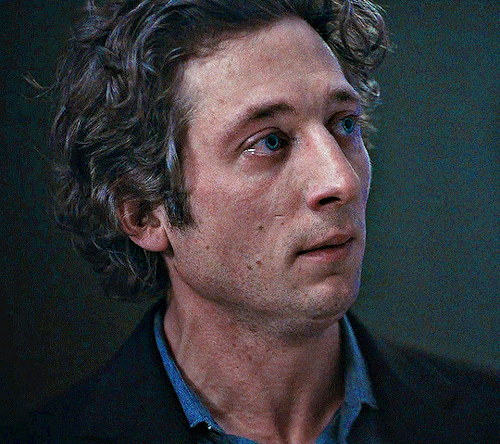


It worked. You're here. The Bear, S03E10
Ayo Edebiri is special to me because bluntly speaking, every time a young actress of colour blows up in Western media spotlight it's usually a light skinned woman or a biracial person with very Eurocentric features and beauty. It's almost like clockwork every time, and the standards of beauty are carefully upheld by colourism even while maintaining a guise of "diversity". But in Ayo's case, it's really great having a gorgeous and talented dark skinned actress be successful, beloved and hailed as a sapphic icon in a way that does not feel like audience paying lip service or being performative.
Like idk how to articulate but it's just so goddamn rare seeing an actual young dark skinned woc thrive in fandom spaces and in terms of commercial or critical success. I really hope people can learn to accept dark skinned young women in comedies, romances and mainstream show business more often because everywhere in movie and shows fandoms, from edits to fanart to fancasts to *actual* casts are BRIMMING with light complexioned actresses of colour. And dark skinned women are expected to grovel and be grateful for getting those crumbs of representation.






THOMAS SHELBY + smoking



Will regards Hannibal with something approaching a smile.